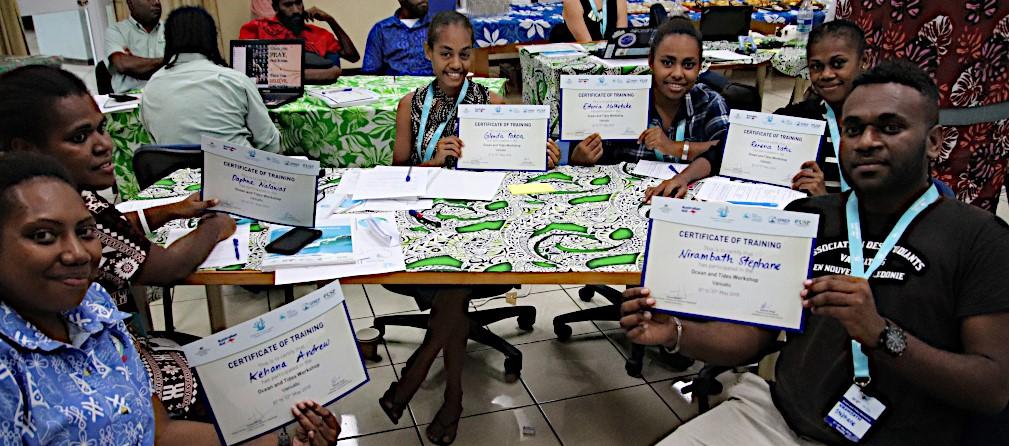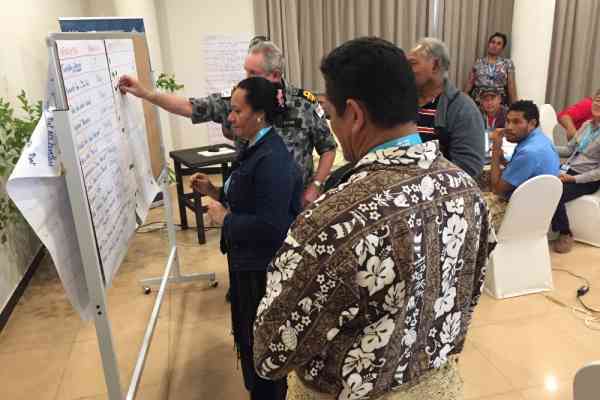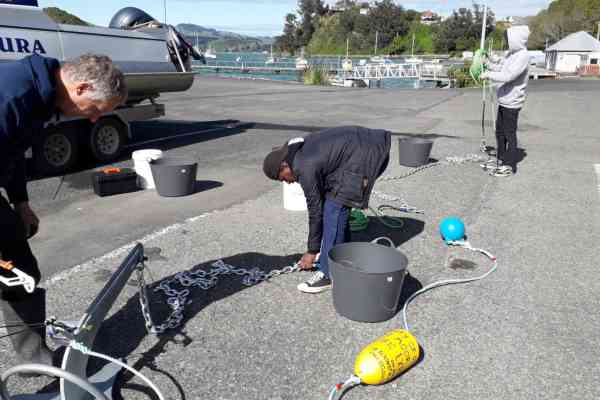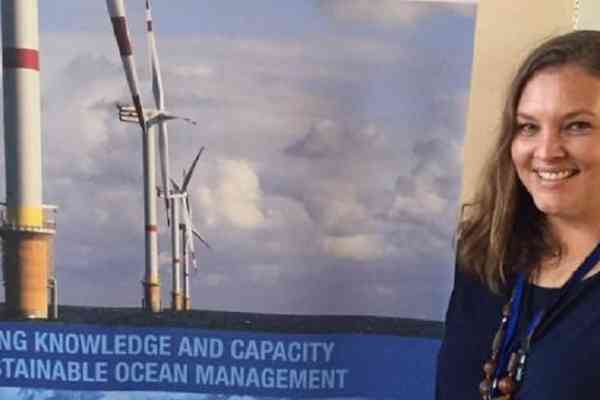Across the Pacific Islands, the ocean separates, connects, threatens and sustains us. The ocean has a tremendous impact upon the lives of every islander, but we are only gradually beginning to understand the enormous impact we are having on it. Ensuring the sustainability of the ocean for future generations is at the forefront of global discussions and strategies. However, talk is not enough; we cannot manage what we do not monitor which is why ocean science and observations are critical to guide smart ocean policy.
In the Pacific, the island nation of Vanuatu is leading the way on ocean science by enacting the region’s first national ocean policy. As part of this work, the Vanuatu Meteorological and Geo Hazards Department (VMGD) have recently developed an ocean outlook for the public and for specialised users.
From ocean science to service
On the 6th-8th of May 2019, scientific staff from the Vanuatu Meteorological and Geo Hazards Department gathered in Port Vila for the first day of “Ocean Science to Service” technical training sessions, curious about how this training would benefit them and the people of Vanuatu.
By the third day of the training, any doubts about the relevance of the training had been put to rest by the comprehensive and practical focus of the sessions. This included training on navigating the Pacific Ocean Portal for ocean data and information, as well as accessing and reading data from the tide gauges. The team ending their training highly enthusiastic about new skills in specific technical areas that will enable them to deliver critical ocean services for the people of Vanuatu.
Robson from the VMGD stated:
“I found this workshop really important because the ocean has been part of Pacific culture for ages. The training has allowed us to know the science behind our ocean and now we can narrate from the Pacific Ocean Portal and provide information to the people of Vanuatu. For example, with the Pacific Ocean Portal we can inform people about ocean currents to guide them to potential fishing areas.”
Along with VMGD staff, participants from key sectors such as the Vanuatu Fisheries Department (VFD) and Department of Tourism and other stakeholders were present throughout the 3-day training. Including key personal from these related sectors allowed them to both to learn and contribute insights on ocean management and sustainable development to more effectively package and deliver information to their customers and beneficiaries.
Peter from VFD stated:
“I think it’s very useful for us based in the fisheries department, especially knowing how to find and analyse sea surface temperature and how to understand how weather impacts the ocean and the movement of fish. I think in the past 3 days we have learned a lot and it will be very useful for us to get this information back into the communities we work with.”
How is ocean information going to be available to the people of Vanuatu?
Ocean scientists and experts from the Pacific Community (SPC) have been working with Pacific National Meteorological Services (PNMS) to build up and support their regional ocean services. VMGD already produces a monthly Climate Outlook, which contains specific information about rainfall and temperature for an area or country and informs of whether the upcoming months will be wetter or drier. During the workshop, participants highlighted the need to produce an ocean outlook as well. This Ocean Outlook will provide key information on sea surface temperature, tides, coral bleaching alerts and more. A draft ocean outlook is now in development.
Allan Rarai (Acting Manager, Climate Services Division VMGD) stated:
“We have been trying to produce an Outlook for the people of Vanuatu and it is the right time to have this workshop to find this information from the Pacific Ocean Portal. Now we know how to use the Portal how to find information for our key stakeholders. We also want to get consensus from the room to ensure that what we put out will be easy for the public to understand.”
Relevant for Vanuatu
After 3 days of technical training with VMGD, the team moved into 2-days of Ocean Policy dialogue and ocean stakeholder engagement. This was necessary to bridge the connection between VMGD and users of ocean data in Vanuatu. It also provided the opportunity for policy makers to discuss Vanuatu’s National Ocean Policy with policy implementers, and to talk with SPC scientists to see how to access PCCOS support for the National Ocean Policy.
Vanuatu was the first country in the region to adopt a National Ocean Policy. It aspires towards multi-sectoral coordination to conserve and sustain a “healthy and wealthy ocean” for the people and culture of Vanuatu.
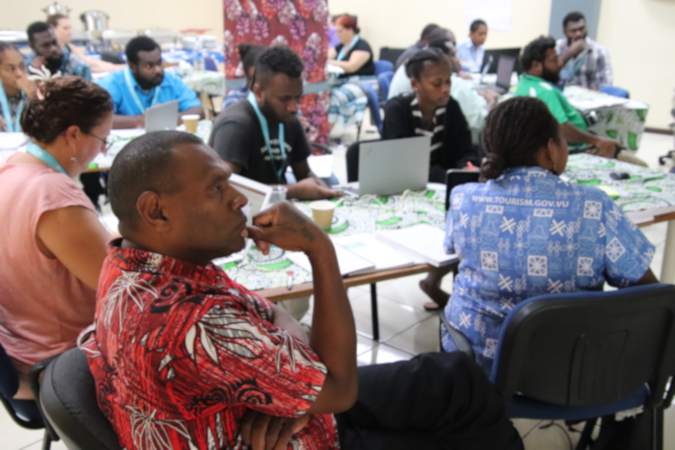
“It is very relevant to Vanuatu culture. Ours is a culture of concern for our ocean. Our national culture is manifested in the resources that the ocean provides our people. Future generations must be able to understand this policy. Consultations are being rolled out right now on the marine spatial plan. People need to understand what this will mean to the communities. We hope to achieve that by next year and expand to have a 90% coverage and understanding of what the policy means to everybody and what the ocean and the resources within mean to them.”
Vanuatu’s Maritime and Oceans Division Head, Toney Tevi, noted that the collaborative approach of the dialogue and workshop helped to establish a “missing link” in how Vanuatu would monitor progress against the policy.
“The most important thing about this workshop is it helps everyone to understand our way forward. We are currently doing our marine spatial plan and consultations with people. One of the important tasks that we must achieve by 2020 is to be able to say to our government that here is the space that this particular user is going to use. Now, in order to do this you need science, scientific data and all the data that is required to make that decision. This workshop has already given us a lot of insight into what we should be utilising to make those decisions.”
Pacific Community Centre for Ocean Science (PCCOS)
As the Pacific region’s hub of science, technology and innovation for sustainable development, members of the Pacific Community (SPC) called on the organization to establish the Pacific Community Centre for Ocean Science (PCCOS). This week of training and dialogue in Vanuatu is showing how PCCOS can support excellence on ocean science across the Pacific.

SPC’s Regional Director for Melanesia, Mia Rimon, says,
“The message from our members was very clear, we have so much science and so much information but our members don’t have access to that information to plan on a national basis or even on a sectoral basis. So PCCOS resulted from a very strong call from the members. What we are doing today is the first step in addressing the science to ocean needs of our member governments. “
PCCOS is the platform for coordination and integration of ocean science, knowledge and information in the Pacific and for partnerships with international and regional stakeholders. It brings together excellence in ocean science, knowledge and innovation supporting the region to conserve and sustainably use ocean, seas and marine resources of our Pacific Blue Continent.
The Deputy Director Ocean and Maritime Programme and Coordinator for PCCOS, Thierry Nervale, says ocean is a cross cutting issue and SPC works across all sectors that contribute to progress or tackle some of the issues on ocean.
“So in Vanuatu we presented what is available at SPC in terms of work and data information and how it aligns to the Vanuatu ocean policy and how it contributes and assists Vanuatu to implement and monitor progress against their policy.”
The timing of this week of deliberations around ocean has been appreciated as Vanuatu progresses consultations on its policy, puts more resources toward monitoring, and begins to build an ocean division within the Ministry of Foreign Affairs.
Jeanette added:
“Government-wide we are coming to learn and discover PCCOS. This work of SPC is a very powerful model for Vanuatu and it enhances the policy and it enhances the marine spatial planning for Vanuatu. It is very relevant and I can see from today that PCCOS and Vanuatu’s National Ocean Policy implantation will go hand in hand.”
This workshop and meeting were developed with support from the Australian-funded Climate and Ocean Support Program in the Pacific (COSPPac). Additional support was also provided by ocean experts from SPC, the University of the South Pacific (USP), Vanuatu Klaemet Infomesen blong Redy, Adapt mo Protekt (Van-KIRAP), the Pacific Islands Forum Secretariat Office of the Pacific Ocean Commissioner (OPOC), and the Secretariat of the Pacific Regional Environment Programme (SPREP).
A similar training and workshop is scheduled for Fiji Meteorological Services and stakeholders in July this year.
Since its launch in 2012, COSPPac has worked to build the capacity of Pacific Island Meteorological Services and other relevant agencies to understand and apply climate, ocean and sea level information for the benefit of island governments and communities. COSPPac is now in its second phase. The project is managed by the Australian Bureau of Meteorology in partnership with SPC, Geoscience Australia, the Secretariat of the Pacific Regional Environment Programme (SPREP), and is a key component of the Australian Government’s support to Pacific Island countries in adapting to and mitigating the impacts of climate variability and change.
